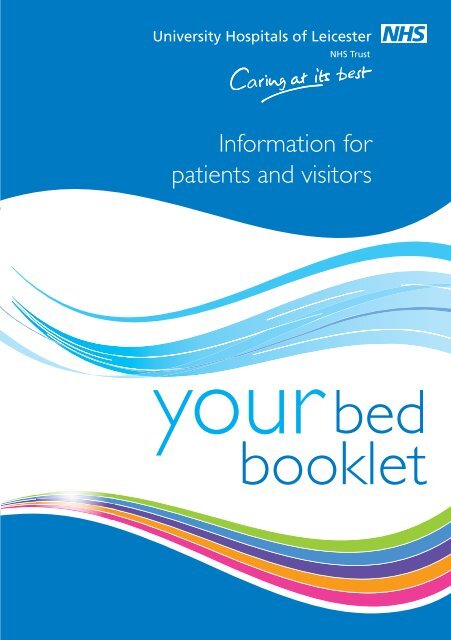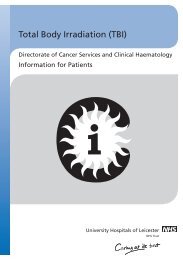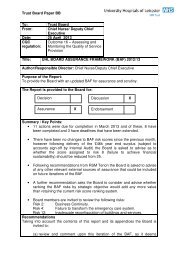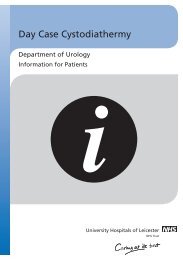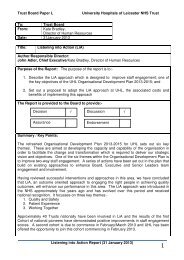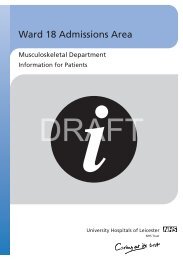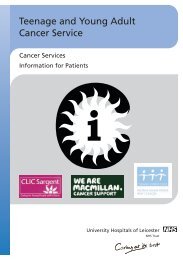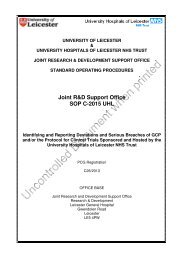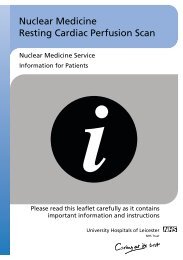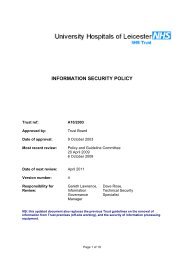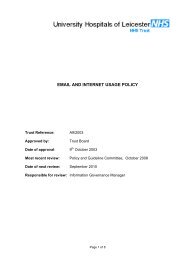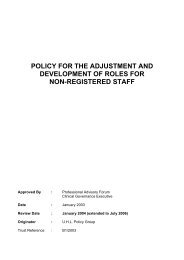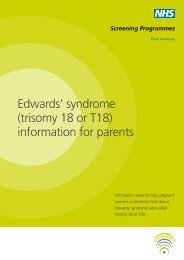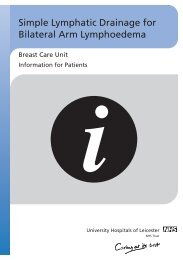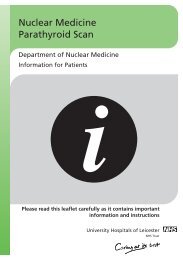Glenfield Hospital Bedside Information for Patients - Library
Glenfield Hospital Bedside Information for Patients - Library
Glenfield Hospital Bedside Information for Patients - Library
You also want an ePaper? Increase the reach of your titles
YUMPU automatically turns print PDFs into web optimized ePapers that Google loves.
Part 1<strong>Glenfield</strong> <strong>Hospital</strong>PostPost is delivered to the wards twice a day, morning and afternoon.For prompt delivery please let friends and relatives know which wardyou are on and use the following address:Patient NameWard Name or NumberUniversity <strong>Hospital</strong>s of Leicester NHS Trust<strong>Glenfield</strong> <strong>Hospital</strong>Groby RoadLeicesterLE3 9QPRadio FoxRadio Fox broadcasts at <strong>Glenfield</strong> twenty four hours a day, sevendays a week, it is a registered charity, staffed by volunteers.If listeners wish to make a request you can call extension 5555 <strong>for</strong>free via the nurses desk or, if you don’t mind paying <strong>for</strong> your call,dial 0116 258 5555 via your Patientline console.Listeners outside the hospital can call on 0116 258 5555 or emailRadio Fox at studio@radiofox.co.ukyour bedbooklet
your bedbookletWelcomeWe want you to be as com<strong>for</strong>table as possible duringyour stay and hope you will find the in<strong>for</strong>mation in thisbooklet helpful during your time in hospital. The teamin charge of your care will make every ef<strong>for</strong>t to keepyou fully in<strong>for</strong>med of your progress and ensure thatyou are ready to leave hospital as soon as possible.You may find that not all of the in<strong>for</strong>mation in thissection will be of interest to you, so just refer to theparts that you feel are relevant.
Part 21. Older people’s championsAn older people’s champion is a member of staff who hascompleted additional training which highlights the specificneeds of the older person.We have more than 1,400 older people’schampions who are working across ourhospitals looking out <strong>for</strong> the needs of olderpeople. Older people’s champions will listento concerns, questions or comments, speakout <strong>for</strong> older people and provide reassuranceand assistance. They can be identified by theiroak tree badge.Memory concerns<strong>In<strong>for</strong>mation</strong>If you are known to experience memory problems or confusion, apatient profile can be competed by you, a relative or carer, to helpstaff communicate more effectively with you during your stay inhospital. Please ask a member of staff <strong>for</strong> further details.your bedbooklet
Part 2What you can do to help us fightinfections:• Use your own toiletries• Keep your hands and body clean<strong>In<strong>for</strong>mation</strong>• Wash your hands with soap and water be<strong>for</strong>e eating andafter using the toilet• If you use a commode ask <strong>for</strong> a bowl of water to wash yourhands in afterwards• If the bathroom or toilet isn’t clean, report it immediatelyto the nurse in charge of the ward and ask <strong>for</strong> it to becleaned. Use an alternative (if available) in the meantime• Keep the top of your locker and bedside table clutter free.It’s easier <strong>for</strong> us to clean• Always wear something on your feet when you get out ofbed. Slippers are fine, but make sure they have some gripon the bottom - hospital floors can be a little slipperysometimes!• Your bed-area should be cleaned regularly. If you or yourvisitors see something that has been missed, report it to thenurse-in-charge and ask <strong>for</strong> it to be cleaned.
Part 2<strong>In<strong>for</strong>mation</strong>To help prevent a clot during your stay you can:• Drink lots of water unless advised otherwise. This helps to keepyour blood flowing freely.• Keep moving your legs. This stops your blood from slowingdown and clotting.• Walk around. If you are not able to get out of bed, keep yourlegs moving. If this is difficult, exercise your ankles. The more youdo this, the better.What staff might do:Staff may not need to do anything more than encourage you to dothe things listed above. If you are more at risk – <strong>for</strong> example if youare having surgery - there are two things they may do:• They may give you some tight stockings to put on your legs.These squeeze your legs to help keep the blood moving• They may also give you some daily, small injections of a medicinecalled Heparin. This encourages the blood to flow rather thanclot.When you go homeWhen you have left hospital you are still at risk. A blood clot can still<strong>for</strong>m while you are getting better. You can make this less likely byfollowing the advice in this leaflet, drink lots of fluids (unless advisedotherwise) and keep as mobile as possible. Seek medical adviceimmediately if you are concerned about new symptoms of leg pain,leg swelling or chest pain and breathlessness.If you have any questions while you are in hospital, please ask yourward nurse. If you would like further in<strong>for</strong>mation once you gethome, visit:Lifeblood - www.thrombosis-charity.org.uk
Part 24. Same sex accommodation<strong>In<strong>for</strong>mation</strong>Every patient has the right to receive high quality care that issafe, effective and respects their privacy and dignity. We arecommitted to providing every patient with same sexaccommodation.<strong>Patients</strong> who are admitted to any of our hospitals will only share thearea where they sleep with members of the same sex. Same sextoilets and bathrooms are close to the bed area and are clearly signposted.Exceptional circumstances:Our staff will always provide access to safe acute clinical care andsaving lives will always be our priority. However, providing access tosame sex sleeping areas has become an important part of the cultureof our clinical teams.Sharing with members of the opposite sex will only happen byexception based on clinical need (<strong>for</strong> example where patients needspecialist equipment such as in intensive/coronary care units or onadmission wards), or when patients choose to share (<strong>for</strong> examplewhen having renal dialysis). Your privacy and dignity will bemaintained throughout.There will sometimes be a need to share accommodation in otherareas of our hospitals when a patient’s clinical care and treatmentbecomes more important than providing same sex accommodation.If this happens it will always be <strong>for</strong> the shortest possible time and afull explanation will be provided. We will do our best to ensure yourprivacy and dignity is maintained.your bedbooklet
Part 25. Stopping smoking<strong>In<strong>for</strong>mation</strong>During your hospital stay you will be asked about whether yousmoke. If you smoke you are more likely to suffer complicationsduring your treatment.Stopping smoking is the most effective thing you can do to helpyour recovery during your hospital stay and to reduce the risk ofadditional illness.On admission to this hospital you will be offered a referral to theNHS Stop Smoking Service. The Stop Smoking Service will supportyou with medication such as patches, gum or medication, as well asfriendly help and advice on discharge about how to break the habit.Please call the STOP team on 0116 295 4141 <strong>for</strong> more details.6. VolunteersDuring your stay in hospital you may meet some of our 1000volunteers.Our volunteers wear aqua polo shirts and ID badges with their nameand role. Volunteers are here to improve your experience by offeringextra help and support.Volunteers are available in the main reception areas to guide you orto offer you transport on our patient buggy. Some volunteers helpon the wards with drinks, meals and other tasks and some will visitpatients and run errands to the shops or restaurants <strong>for</strong> you.We have a volunteer library service, hairdressers and even a PAT Dog.All of our volunteers have completed a comprehensive registrationand training process so that they can offer you the best possibleservice.If you would like more in<strong>for</strong>mation about volunteering orwould like a volunteer to visit you or your relative please callVolunteer Services on 0116 258 3955 /7221 /8868
Part 27. The Chaplaincy<strong>In<strong>for</strong>mation</strong>The hospital chaplains are available to offer support to you and yourrelatives. Our team includes a range of faiths and outlooks includingChristian, Hindu, Humanist, Muslim and Sikh Chaplains, as well as arange of volunteers of various faiths and outlooks.You don’t have to feel you are a religious person or be a regularworshipper to make use of our services. Coming into hospital <strong>for</strong>any sort of investigation or treatment can raise all kinds of questions,anxieties and fears.Chaplains are always ready and willing to listen in confidence and tohelp you in your search to understand and make sense of what ishappening to you. We are here to help you find that sense of innerpeace which is such an important part of the healing process.Chapels and prayer roomsThere are chapels and prayer rooms at all three hospitals. They arealways open (except at the Royal where they are closed at night) andprovide a place <strong>for</strong> prayer or quiet reflection.Locations and times of prayers and services are displayed on thechaplaincy notice boards and around the wards. If you wish toattend a prayer service please in<strong>for</strong>m the nursing staff. If you needto be collected in a wheelchair please ask the staff to in<strong>for</strong>m thechaplains.your bedbooklet
Part 2<strong>In<strong>for</strong>mation</strong>Requesting a visitMembers of the chaplaincy team regularly visit the wards so doplease let us know if you would like to talk. Nursing staff will alsopass on requests <strong>for</strong> a chaplain to visit.Non-urgent and confidential messages can be left on the chaplaincyanswerphone by phoning:<strong>Glenfield</strong> <strong>Hospital</strong>: (0116) 258 3413Leicester General <strong>Hospital</strong>: (0116) 258 4243Leicester Royal Infirmary: (0116) 258 5487If you wish we can pass a message to someone of your own faith,denomination or outlook and ask them to visit you.8. Pain assessmentWhilst you are in hospital you will be asked by the nursing staff ifyou have any pain.We use a 0 - 10 pain scale.0 is no pain10 is the worst pain you can imagine.You will be asked periodically to rate your pain between these 2points.It is important that you tell us:• How bad your pain is - using the 0 -10 scale• Where your pain is• What it feels like - stabbing, shooting, burning.We will do everything we can to keep you com<strong>for</strong>table whilst youare in hospital. However it is not always possible to keep youcompletely pain free especially if you have had an operation.
Part 29. Property disclaimer<strong>In<strong>for</strong>mation</strong>We are committed to providing you with excellent healthcare.Un<strong>for</strong>tunately, whilst we are caring <strong>for</strong> you we are not able tocare <strong>for</strong> your property.The Trust will not accept liability in respect of any loss or damageto patients’ property and belongings unless they have beenhanded over to members of staff <strong>for</strong> safekeeping and a receipthas been issued to you or your relative.We strongly advise that you do not bring property into thehospital and ensure that any property brought into the hospital issent home.This disclaimer also applies to belongings required in daily life,such as, dentures, spectacles and hearing aids.your bedbooklet
Part 210. Pressure ulcers<strong>In<strong>for</strong>mation</strong>A pressure ulcer (also called bed sore or pressure sore) is an area ofyour skin which is damaged due to prolonged pressure resulting inlocal pain with or without actual skin loss.The first signs of pressure damage are local pain and a change in thecolour of the skin. Depending on the degree of skin/tissue damagethis may get progressively worse and lead to an open wound/ulcerwhich can become infected.The most common sites <strong>for</strong> pressure damage is over bony areas(where the bones are close to the skin) e.g. bottom, heels, elbows,ankles, back of the head, hips, etc.Who gets pressure sores?Anyone can get pressure sores and at any age if they become very illand cannot move properly. Un<strong>for</strong>tunately there are people whoserisks are increased considerably due to different conditions orillnesses or nutritional and mobility problems.What can be done to prevent pressure ulcers?When you are admitted nursing staff will look closely at yourpressure areas and use a risk assessment tool (called Waterlow) toidentify whether you are ‘at risk’ of developing pressure damage.This assessment is very important because it alerts us that you mayneed special equipment and increased nursing care.
Part 2<strong>In<strong>for</strong>mation</strong>To help prevent pressure ulcers, we may encourage you to:• Turn and reposition. We will encourage you to do this if you areable to do so.• You may have been asked to use special equipment such asan air mattress; cushions; leg troughs. All of our hospitalmattresses are high specification foam mattresses which providelow to moderate pressure relief.• Skin care – we will provide regular hygiene if you havecontinence problems. We may use moisturising creams toimprove skin condition, or use barrier creams to prevent skindamage.We have a specialist team providing access to expertise in promotinggood skin care and wound management, if you would like to speakwith a member of this team please ask the ward team to contactthem.your bedbooklet
Part 211. Ward transfers and dischargearrangementsDuring your stay in hospital it may be necessary to move you todifferent wards within the hospital or to other NHS care providers toensure that you receive ongoing assessment and appropriatetreatment <strong>for</strong> your needs.It is important to start planning your discharge arrangements asearly as possible, as you start to recover the team will discuss goinghome and the arrangements that might need to take place once youare ready to be discharged.As part of planning your discharge the team will carry out anassessment of your needs. This involves looking at what is best <strong>for</strong>you. The team is made up of doctors, nurses, physiotherapists,occupational therapists and social workers, who will discuss yourneeds and the options with you and, with your permission, willinvolve close relations or friends who support you at home.The assessment will consider which one of the following isbest <strong>for</strong> you.1. Discharge to your home2. Discharge home with support such as a care package by SocialServices3. Going home but with a course of rehabilitation/intermediate care(a place where you can go <strong>for</strong> a short time) be<strong>for</strong>e you go home4. Rehabilitation (ongoing care) in another hospital or in a suitableresidential home5. Discharge to a nursing/residential home.<strong>In<strong>for</strong>mation</strong>
Part 2<strong>In<strong>for</strong>mation</strong>There are lots of people available to help with your dischargepreparations and wherever possible they will assist you to returnhome.If it is agreed that you will need a 24 hour care environment ondischarge, in the short or longer term, Social Services will help youto arrange this.Due to the demand <strong>for</strong> hospital beds we may need you to move to atemporary care placement if agreed options <strong>for</strong> your future care arenot available when you are no longer in need of hospital care. Pleasebe aware that you should accept the temporary placement as youcannot continue to occupy a bed in this hospital once you are ready<strong>for</strong> discharge and a suitable place has been offered.your bedbooklet
Part 212. Patient in<strong>for</strong>mation and liaison service(PILS)Your comments and feedback about your experience with us areinvaluable and welcomed.In the first instance please talk to the nurses on the ward, the wardsister, or ask to speak to the matron. If issues remain unresolvedthen please contact us directly:Freephone: 0808 178 8337Email:In Writing:pils.complaints.compliments@uhl-tr.nhs.ukTrust HeadquartersGwendolen HouseGwendolen RoadLeicesterLE5 4QFFurther in<strong>for</strong>mation can be found on the trust website:<strong>In<strong>for</strong>mation</strong>www.uhl-tr.nhs.uk/patients/support-and-advice/making-a-complaintPlease be assured that if you raise a concern or make a complaintyour future health care will in no way be affected. Should you needhelp to raise your concerns because of special health or languageneeds this can be arranged.13. InterpretersPlease in<strong>for</strong>m a member of staff if you require an interpreter.We are committed to preventing discrimination and fosteringequality and diversity.The printing of this booklet has beensupported by Leicester <strong>Hospital</strong>s Charity9102655
University <strong>Hospital</strong>s of LeicesterNHS Trustwelcometo your wardyourbedbookletPart 3


